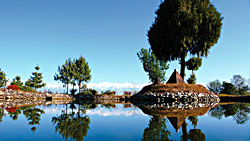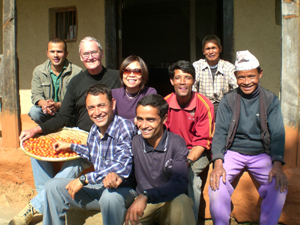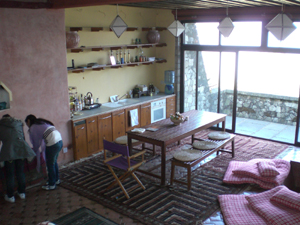 |
When Hans Hofer first came to Nepal over land from Germany in 1969, he went up to Nagarkot to see the sunrise and had what he calls a "this is it" moment.
He sold his Volkswagen bus to a member of Nepal's royal family and decided then and there he wanted to work and retire in Asia. He hitchhiked to Singapore, and in 1970 produced his first guidebook on Bali.
Within 15 years, Hofer's Insight Guides had become a global publishing empire with 400 titles spanning 125 destinations. The Nepal edition of Insight Guides came out in 1985 and became an instant bestseller at a time when tourism to Nepal was booming. It was translated into Spanish, German, Italian and French and is now in its 25th edition. A guidebook just for Kathmandu Valley was produced in 1989. Then in 1999 Hofer sold the entire business to the German company, Langenscheidt.
 |
"The creative part of the work was tapering off, and I saw printing on paper as a sunset industry," explains Hofer, "besides, since the very beginning I had always looked beyond publishing to this concept of combining organic farming with eco-tourism."
Hofer returned to Nepal to look for the magic spell that the Nagarkot sunrise has cast over him. After much searching, he found Phulbari of Kabhre and there in 1996 he and his wife, Cynthia, set out to build their dream organic farm and resort. It coincided with the start of the conflict, and it wasn't easy when staff were harassed by both the Maoists and the army.
But Hofer and Cynthia persevered and the couple now spends a few weeks every three months here supervising their Organic Himalaya farm that produces chemical-free vegetables, fruits, jam and teas for sale in selected outlets in Kathmandu and even air-freights them to Singapore.
"I see it as a way to give back to Nepal and the community," says Hofer who hopes his farm will be a catalyst for surrounding villages to raise income and serve as a marketing outlet. With their contacts in Singapore, Hans and Cynthia already fly out one shipment every two weeks of Kabhre vegetables to Singapore where they are sold to health-conscious foodies.
 REFLECTED GLORY: The central Himalaya reflected on the rainwater harvesting pond that feeds the vegetable patches of Organic Himalaya in Kabhre. |
"The feedback has been amazing, our customers know they are eating chemical-free vegetables, but they have been really impressed with the taste," says Cynthia, "it's something about the soil, climate and care in Nepal that brings out the taste."
 |
The farm also rents out its residential space for two families at a time for weekends and long-term creative retreats preferred by writers, painters and poets. Apa Phulbari Villa is only an hour's drive east of Dhulikhel on the Sindhuli Highway and from its 1,800m elevation over the Panchkhal Valley, offers a sweeping view of the northern horizon from Ganesh Himal to Numbur.


